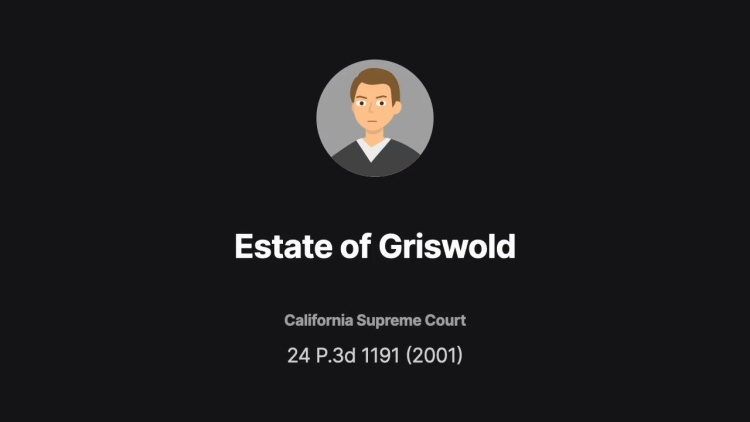Estate of Griswold
California Supreme Court
24 P.3d 1191 (2001)
- Written by Angela Patrick, JD
Facts
Denis Morris was born out of wedlock. Denis’s birth certificate listed his father as John Draves, and his mother filed a court petition to declare Draves as Denis’s legal father. In court, Draves admitted that he was Denis’s father. Per court order, Draves then paid the mother’s pregnancy-related medical expenses and weekly child support for the first 18 years of Denis’s life. Draves and Denis never had any contact, though. When Denis was a year old, his mother married Fred Griswold. Denis began going by Denis Griswold, and he thought for many years that Fred Griswold was his biological father. Draves married and had two children. Draves never told these children about Denis. Denis’s mother and Draves both died before Denis. When Denis died, he was married to Norma Doner-Griswold (plaintiff) and had no children. Denis did not have a will. Denis’s half-siblings, Draves’s other two children, were still alive and assigned their rights in Denis’s estate to Francis See (defendant), a self-proclaimed forensic genealogist who hunted for inheritances. Doner-Griswold filed a petition to have Denis’s estate distributed to her under the intestacy laws. See objected to the distribution, claiming that part of Denis’s estate belonged to Draves’s other two children under the intestacy laws and that she owned the rights to that portion. The validity of See’s claim turned on whether Draves had a right to inherit from Denis. The trial court found that Draves had no inheritance rights, but the appellate court reversed and found that Draves did have a right to inherit from Denis’s estate. The California Supreme Court granted Doner-Griswold’s petition for review.
Rule of Law
Issue
Holding and Reasoning (Baxter, J.)
Concurrence (Brown, J.)
What to do next…
Here's why 911,000 law students have relied on our case briefs:
- Written by law professors and practitioners, not other law students. 47,100 briefs, keyed to 997 casebooks. Top-notch customer support.
- The right amount of information, includes the facts, issues, rule of law, holding and reasoning, and any concurrences and dissents.
- Access in your classes, works on your mobile and tablet. Massive library of related video lessons and high quality multiple-choice questions.
- Easy to use, uniform format for every case brief. Written in plain English, not in legalese. Our briefs summarize and simplify; they don’t just repeat the court’s language.





